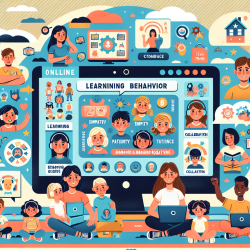Introduction
In the ever-evolving landscape of online therapy, leveraging data to drive decisions is paramount. A recent study, "Improving Uptake of a National Web-Based Psychoeducational Workshop for Informal Caregivers of Veterans: Mixed Methods Implementation Evaluation," provides a treasure trove of insights that can be harnessed to enhance the effectiveness of web-based programs. As practitioners, understanding and implementing these findings can significantly improve the outcomes of our therapy services, particularly for children.
Understanding the Research
The study in question evaluated the implementation of the "Building Better Caregivers" (BBC) workshop, a web-based psychoeducational program designed for informal caregivers of veterans. The research utilized a mixed-methods approach to identify strengths and weaknesses in the program's initial implementation and recommended strategies to improve its uptake. The findings are crucial for practitioners looking to enhance their skills in delivering online therapy services.
Key Findings and Their Implications
The study identified several key areas where improvements could be made to increase the program's reach and effectiveness:
- Outreach and Marketing: Effective outreach and marketing were identified as critical components for successful implementation. Tailoring strategies to specific stakeholder groups and using diverse delivery options were recommended.
- Training and Support for Staff: Continuous training and mentoring for new staff were highlighted as essential for maintaining program fidelity and effectiveness.
- Data Management: Comprehensive data management and reporting capabilities were emphasized as necessary to support outreach efforts and track program enrollment and outcomes.
Applying These Insights to Child Therapy
For practitioners in speech-language pathology, these findings offer valuable lessons that can be applied to improve outcomes for children receiving online therapy:
- Customized Outreach: Just as with caregivers, reaching the right audience is crucial. Tailor communication strategies to engage parents, educators, and other stakeholders effectively.
- Continuous Professional Development: Ensure that therapists receive ongoing training and support to adapt to new technologies and methodologies in online therapy.
- Robust Data Systems: Implement data-driven approaches to monitor progress, evaluate program effectiveness, and make informed decisions about therapy interventions.
Encouraging Further Research
While the study provides a solid foundation, it also highlights the need for ongoing research in the implementation of web-based programs. Practitioners are encouraged to engage in further research to explore innovative strategies and technologies that can enhance therapy outcomes for children.
Conclusion
By embracing data-driven strategies and continuously refining our approaches, we can significantly improve the effectiveness of online therapy programs. This not only benefits caregivers and veterans but also has the potential to transform therapy outcomes for children. As practitioners, it is our responsibility to stay informed and apply these insights to create impactful, accessible therapy solutions.
To read the original research paper, please follow this link: Improving Uptake of a National Web-Based Psychoeducational Workshop for Informal Caregivers of Veterans: Mixed Methods Implementation Evaluation.










